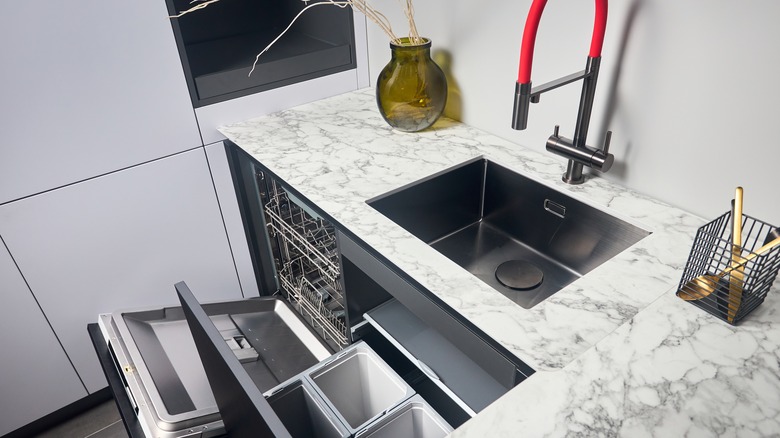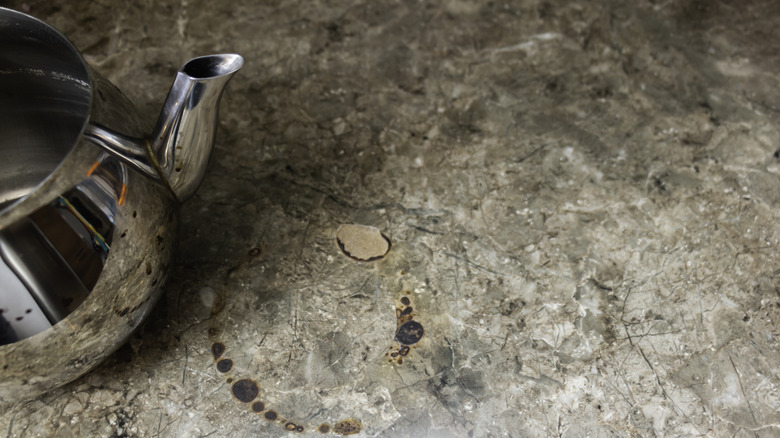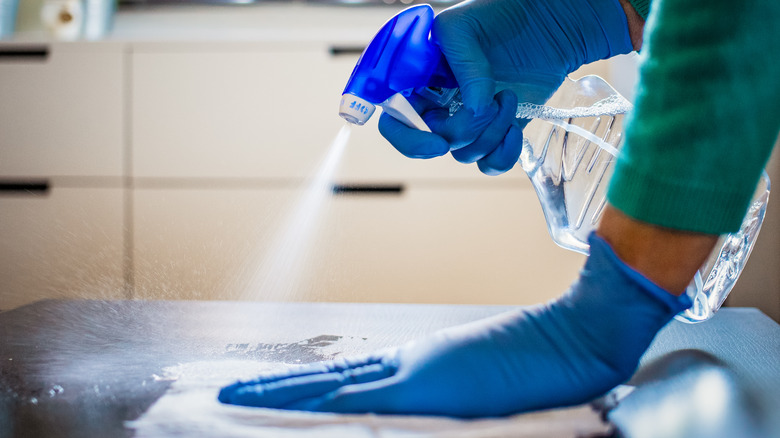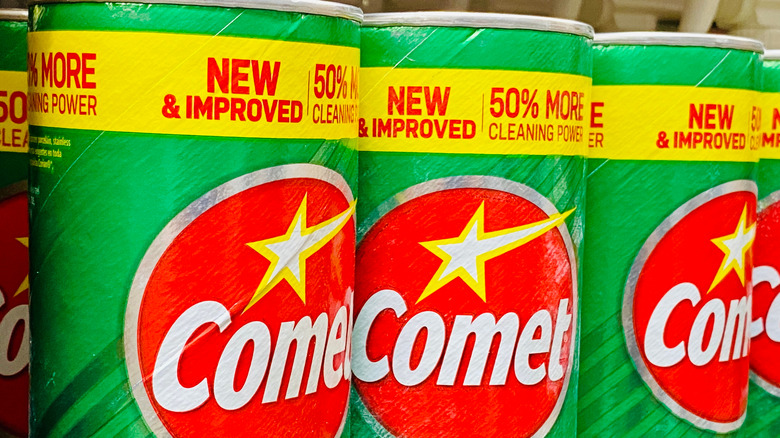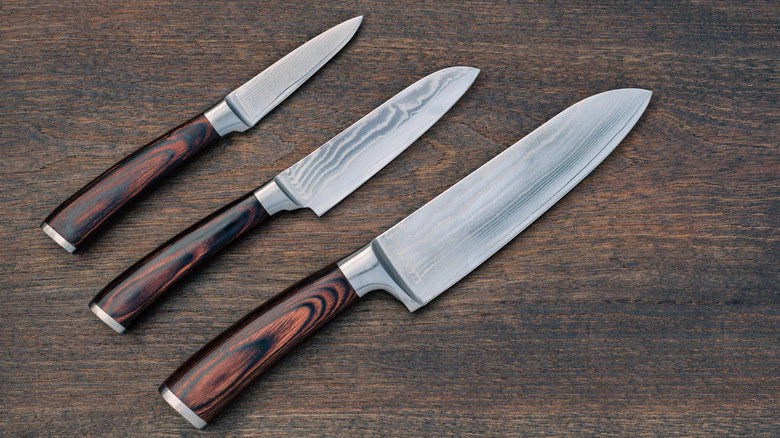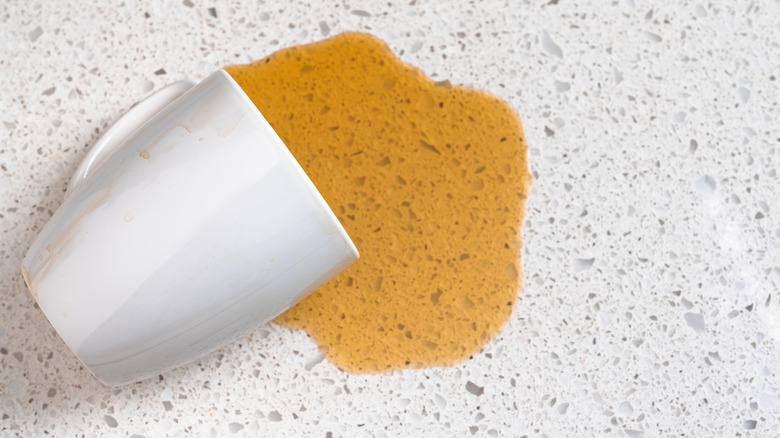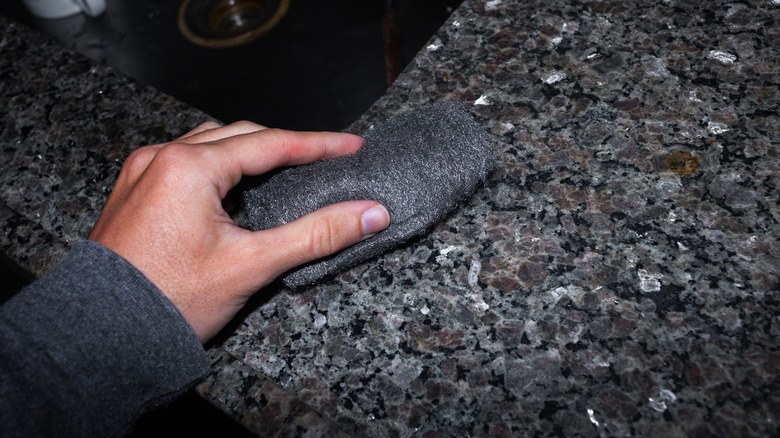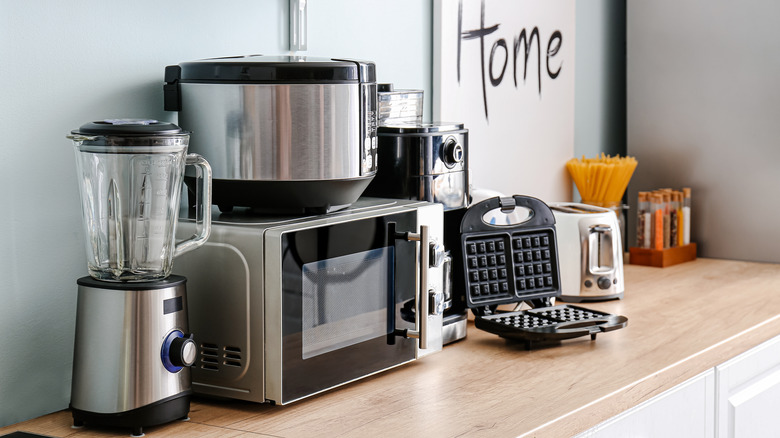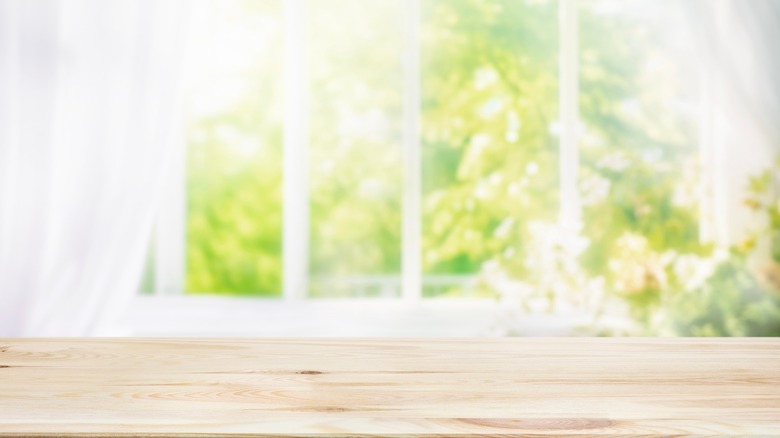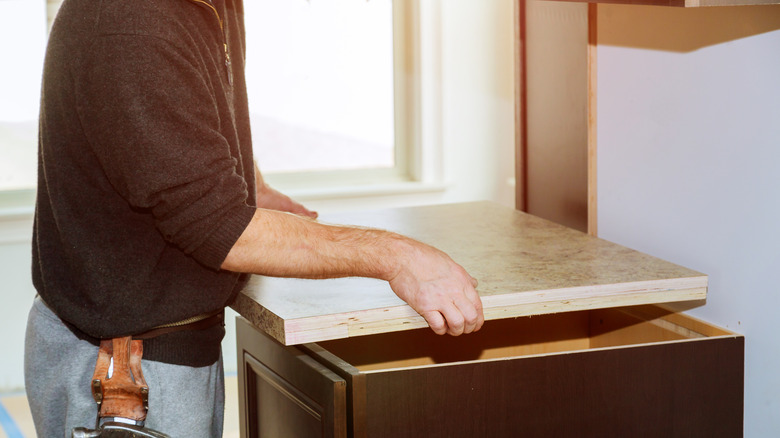9 Things To Avoid At All Costs If You Have Laminate Countertops
Laminate countertops first made their appearance at the end of the 1940s, although laminate was actually invented a decade earlier. The new countertop option quickly became popular due to its budget-friendly price tag. It retains its popularity today, as laminate is available in a wide range of colors and styles, making it easy for homeowners to get their desired aesthetic. Laminate typically lasts 15 years before needing to be replaced; however, with proper care, it can continue to serve the family for another 5 years.
Caring for laminate countertops involves much more than simply wiping up spills as soon as they happen. It also requires avoiding a host of practices that may be fine for other countertop types, but not for laminate. These include using the wrong type of cleaner and failing to protect the countertop from heat and moisture. Additionally, laminate should never be painted without first being cleaned and sanded. Otherwise, the paint won't adhere to the laminate. Steer clear of these simple mistakes, and your laminate countertops will last you for many years to come.
Refrain from putting hot pans on laminate
While it can be tempting to set a pot of boiled eggs or a tea kettle on your countertop for just a minute, this should be avoided at all costs. Laminate consists of a thin top layer that is glued to an underlying material, commonly referred to as a substrate. Temperatures of just 140 degrees Fahrenheit can separate the substrate from the laminate, as it can melt the glue. That means even a hot cup of coffee, which runs between 155 and 175 degrees Fahrenheit, can cause damage to a countertop made of laminate. You'll need to refrain from putting these types of items directly on the surface of your counter.
In addition to hot pots and pans, you'll want to protect your countertop and a variety of appliances when they are being used. These include a toaster, microwave, crockpot, air fryer, and pressure cooker. Pick up a heat-resistant silicone mat that can be placed underneath the appliances to protect the countertop. Potholders and trivets work well for pots, pans, and plates. Cupholders are best for your coffee and tea.
Never disinfect laminate with bleach
Kitchen countertops are exposed to a variety of bacteria, especially when preparing things like raw chicken and fish. It's extremely important to properly disinfect countertops after working with these foods, otherwise, you risk a foodborne illness, such as Salmonella enteritidis, Staphylococcus aureus, and Listeria monocytogenes. Since bleach is effective against these bacteria, you may be inclined to use it on your laminate, but this would be a big mistake. Bleach is too strong for laminate and can damage it, so you'll want to avoid using this common cleaner on laminate at all costs.
Not only will bleach discolor and warp your laminate, but it can also remove the protective top coat. Instead of taking a chance and disinfecting the counters with bleach, choose a gentler cleaner. Lysol's All-Purpose Cleaner is an excellent option. Simply spray your countertops with the Lysol, wait two minutes for the product to disinfect the surface, and then wipe the counter clean with a paper towel.
Avoid using abrasive cleaners
Bleach isn't the only cleaner you need to be wary of. Abrasive cleaners, like Comet and Bar Keepers Friend, are also a no-no when it comes to taking care of your laminate countertops, as they can scratch the surface of the laminate. This leaves the counters looking damaged and worn. In order to extend the life of your laminate countertops, you'll need to stick with milder cleaners, such as a liquid dish soap or a product listed as safe for use on laminate.
Several cleaners to use instead of abrasive options include Formula 409, Weiman Cleaner, and Simple Green. For simple spills, just grab a soapy dish rag and wipe up the mess. Go back over the area with a towel to dry the spot. When you need a more thorough clean, grab one of the non-abrasive options listed above. If you're looking to give your laminate countertops a nice shine, there's a common cleaner available that will help you do just that. A little Windex Multisurface Cleaner goes a long way, and it even has disinfecting powers that make it a win-win!
Never cut directly on the countertop
While you can use a knife on certain types of countertops, such as quartz, this is not advisable for laminate. Laminate isn't made of a hard material, and it doesn't resist cuts and scratches, which means you'll never want to use a knife directly on the countertop. Avoid slicing chicken breasts, dicing onions, or cutting your child's sandwich without a cutting board. Cuts and scratches in laminate surfaces are likely to chip and become larger over time. Not only are cuts in your laminate unsightly, but they also provide a space that can breed bacteria.
You'll want to use one cutting board strictly for raw meats and one for vegetables and cooked foods. This helps to prevent cross-contamination. Depending on what material your plates are made out of, you may even be able to slice a hot dog or a piece of steak right on the plate itself.
Keep large amounts of liquid from pooling on the countertop
Another thing to avoid at all costs when opting for laminate countertops is excessive moisture. Liquid that is allowed to pool on the surface of the counter, such as a spilled glass of milk or the condensation from a glass of iced tea, can actually weaken the seams. Over time, the weakened seams will begin to separate. At that point, you'll need to call in a professional repairman to fix the issue, resulting in a bill that you could have averted.
There are several ways you can take action to protect your countertops from excess moisture. As soon as you experience an accidental spill, clean it up using a cloth or a paper towel. Place a coaster under all cups and glasses, including baby bottles. Use a dish drainer when air-drying dishes. When cleaning, administer a light spray and then quickly wipe it up. If you work in sections, rather than wetting the entire counter at once, you'll avoid one area staying wet for too long.
Never use a steel wool pad on grease and stains
Just like other countertop types, laminate is susceptible to grease build-up and stains. Using the proper tools to remove grease and stains is just as important as which cleaners you select. Steel wool pads, for example, have the capability to lift away tough messes; however, they will also leave marks all over your laminate. You'll need to avoid any type of scouring pad or scrub brush.
Instead of a steel wool pad, grab a paper towel, a washcloth, and a grease-fighting dish soap. Use the paper towel to soak up as much of the grease or stain as you can. Then, go over the area with a washcloth soaked in hot, soapy water. If you're still left with stains, you can create a cleaning paste using a little baking soda and water. Smear the non-abrasive paste over the stain, wait five minutes, and then wipe away the baking soda. The stain should be gone.
Avoid burdening laminate with excessive weight
Laminate countertops have a lot of benefits, but being strong isn't one of them. Unlike countertops made of stone, laminate isn't designed to support heavy items. Excessive weight can actually damage the laminate countertops, so you should avoid placing heavy objects on them, especially over long periods of time. This includes you. If you want to avoid cracks and fractures, resist the urge to stand on the countertops the next time you need to reach a mixing bowl.
Additionally, laminate is susceptible to stress damage if you lean on any of the counter's edges. Over time, leaning on the counter may cause the edges to split and peel.
Consider an alternative placement for your heavy items, such as a coffee cart or a portable kitchen island. If it's an appliance you only use occasionally, like a pressure cooker, store it in a cabinet or on a pantry shelf. Microwaves can be mounted above a stove. Instead of standing on the countertop, grab a step stool to give you the extra inches needed to reach your upper cabinets.
Don't let direct sunlight reach your countertops
Did you know the sun has natural bleaching powers? This is due to the sun's ultraviolet rays, which are able to lighten the color of an object by breaking down its chemical bonds. This phenomenon occurs even through glass, which means the sunlight hitting your laminate countertops through the window over your kitchen sink can cause the laminate to fade. In order to keep your countertops from looking dull, you'll need to ensure they are not left in the path of direct sunlight.
The only way to protect your laminate countertops from sunlight damage is to cover up any windows or sliding doors. A set of adjustable blinds or a pair of curtains work well for kitchen windows, as long as the curtains aren't too sheer. You can install privacy or blackout curtains if you have a sliding glass door that opens up to a back deck or patio. Simply draw the blinds or close the curtains during the hours of 10 a.m. and 3 p.m., which is when ultraviolet rays are at their strongest.
Avoid trying to make repairs on your own
Many homeowners opt for laminate because of its budget-friendly price tag. Although this countertop option saves money upfront, it can be quite costly in the long run if it isn't properly cared for. It isn't hard for laminate to become chipped, cut, warped, or plagued with burn marks, especially if you have older children at home who are just learning how to bake and prepare their food. Attempting to repair the laminate on your own will most likely make matters worse. This is one job best left to the professionals.
Ask around to find a reliable kitchen countertop installer in your area. Friends and family are always a great resource for referrals. Keep the company's contact information in your phone, so you have it readily available when any problems arise.
